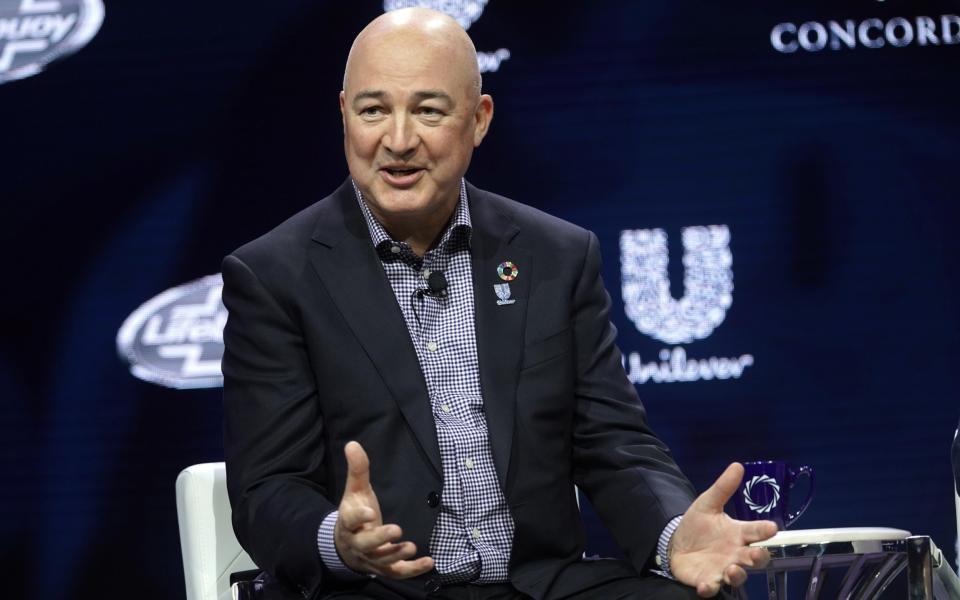Unilever mounts takeover bid for GSK's £50bn consumer arm

Unilever has launched a takeover bid for GlaxoSmithKline’s £50bn toiletries and over-the-counter medicines arm, in an attempt to boost its sluggish growth and tackle shareholder unrest.
The Marmite maker said on Saturday that the business would be a “strong strategic fit”, as it was revealed that three unsolicited bids were made late last year.
The approach, which would be one of the biggest ever takeovers by a UK company, comes as GSK spins off its consumer arm, which makes Aquafresh toothpaste and Panadol painkillers, from its pharmaceuticals unit in a radical shake-up of its own.
Unilever’s offers have all been rejected by GSK and the American drugs juggernaut Pfizer, which owns a minority stake.
The last approach. was made on December 20. It included £41.7bn in cash and £8.3bn worth of Unilever shares. GSK rebuffed the move because it "fundamentally undervalued" the business and "its future prospects".
GSK added: "The board [...] therefore remains focused on executing its proposed demerger of the consumer healthcare business, to create a new independent global category-leading consumer company which, subject to approval from shareholders, is on track to be achieved in mid-2022."
It is understood that the latest approach had been knocked back because it failed to put a premium on analyst valuations and did not account for potential cost savings in a merger with Unilever’s own consumer healthcare brands, which include Dove and Vaseline.
Talks are no longer believed to be active, but a statement from Unliever did not suggest it had abandoned its pursuit. The Sunday Times first reported Unilever’s interest.
Unilever said: “Unilever notes recent reporting regarding its interest in GSK Consumer Healthcare and confirms that it has approached GSK and Pfizer about a potential acquisition of the business.
“GSK Consumer Healthcare is a leader in the attractive consumer health space and would be a strong strategic fit as Unilever continues to reshape its portfolio. There can be no certainty that any agreement will be reached.”
Unilever’s bid comes as boss Alan Jope scrambles to alleviate investor pressure over its lacklustre financial performance, which caused shares to tumble 9pc last year.
Terry Smith, one of Britain’s best known investors and a top 10 shareholder, last week attacked the FTSE 100 company’s “ludicrous” focus on sustainability while profits are under pressure.
The manager of the £29bn Fundsmith Equity fund said the consumer goods giant’s attempts to hand brands such as Hellman’s mayonnaise a higher purpose was a sign that the firm had “lost the plot”.
Unilever’s pre-tax profits have fallen for two consecutive years from €12.4bn (£10.3bn) in 2018 to €8bn in 2020.
A deal with Unilever would require a departure from GSK’s plan to carve out its consumer business as a separately listed FTSE 100 company by the summer. It has discussed selling a keystone stake to a sovereign wealth fund or other investor as part of plans to cash in its stake, reduce its debts and invest more heavily in drug development.
GSK chief executive Dame Emma Walmsley has so far faced opposition to her demerger plans from activist investors Bluebell Capital and Elliott Advisors. Elliott, the hedge fund known for its aggressive tactics, wants a public auction that could attract a bid from a buy-out fund or a deep-pocketed rival. It has also questioned Dame Emma’s leadership and demanded she reapply for her job.
GSK believes that its consumer healthcare arm will grow ahead of the market at 4pc to 6pc rather than 3pc – a faster rate than analysts currently expect. The company is expected to give further details on the division’s growth prospects at a capital markets day on February 28.
Sir Dave Lewis , the former chief executive of Tesco, is poised to spearhead the consumer healthcare arm after being appointed non-executive chairman. Alongside his six-year stint at Britain’s biggest supermarket chain, Sir Dave also spent 28 years at Unilever where he worked with Mr Jope.
GSK has already announced Brian McNamara as chief executive-designate of the consumer business, which is expected to be among the FTSE 20 biggest companies.
Mr McNamara, who is already the head of the consumer business, was pinpointed as the best man for the job despite a six-month search driven by headhunters Spencer Stuart and Egon Zehnder.

 Yahoo Finance
Yahoo Finance 